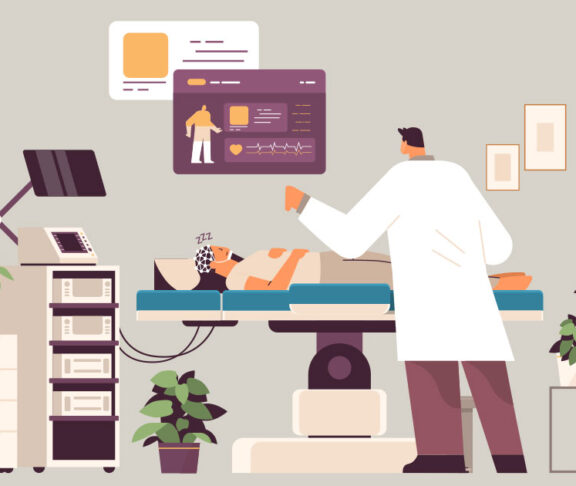Sleep medicine has evolved dramatically in recent years, with new research revealing the profound impact of sleep on overall health.

Amber Allen, B.A., RPSGT, RST, CCSH
President, Board of Registered Polysomnographic Technologists (BRPT); Program Director, Polysomnographic Technology Program
Once overlooked, sleep disorders are now recognized as major contributors to chronic conditions like heart disease, diabetes, and mental health disorders. Sleep technologists, also known as polysomnographic technologists, play a crucial role in sleep medicine by conducting sleep studies, analyzing results, and reporting data to assist physicians in diagnosing conditions like sleep apnea, insomnia, restless legs syndrome, and narcolepsy. These professionals work under the supervision of sleep specialists to monitor patients in real time, ensuring critical data is captured accurately and efficiently.
The role of a sleep technologist
Sleep technologists are responsible for preparing patients for sleep studies by applying sensors and electrodes to monitor brain activity, heart rate, eye and muscle movements, snoring, breathing, respiratory effort, and oxygen levels. They are proficient in operating diagnostic polysomnography equipment to track sleep patterns and positive airway pressure devices to treat sleep-disordered breathing. Sleep technologists often monitor patients overnight, noting disturbances, movement, and other irregularities that may indicate sleep disorders, such as sleep apnea, as well as analyzing and scoring data to assist physicians in diagnosing sleep disorders and recommending treatment. In addition, sleep technologists educate patients on sleep hygiene, treatment devices (e.g., CPAP machines), and follow-up care.
Sleep technologists work in diverse settings, such as sleep clinics and laboratories, hospitals and academic centers, home sleep testing services, and durable medical equipment providers. Important skills include technological proficiency in operating and calibrating sleep diagnostic tools, strong communication skills to explain procedures to patients and collaborate with medical teams, attention to detail for accurate data collection and analysis, and compassion so that patients trust their care and feel at ease during overnight testing.
Earning certifications
Most sleep technologists complete a postsecondary or online module-based program in polysomnographic technology, accompanied by hands-on training. Certification, such as the Registered Polysomnographic Technologist (RPSGT) credential, distinguishes sleep technologists from the rest of the field by awarding a credential recognized by government agencies, licensing bodies, insurance providers, healthcare practitioners, and industry leaders. In addition, sleep technologists can advance their careers by pursuing additional certifications, specializing in pediatric sleep studies, or transitioning into roles such as sleep center managers, educators, patient navigators, or clinical researchers.
A rewarding and in-demand career choice
The demand for skilled sleep technologists is rising, yet the field faces a critical shortage. As awareness of sleep disorders grows, so does the need for experts who can diagnose and improve patients’ quality of life. This career offers not only job stability and professional growth but also the deep satisfaction of making a real impact on public health. Sleep technologists can make a significant impact on a patient’s quality of life in just one night. If you’re looking for a meaningful and in-demand career, now is the perfect time to step into the vital world of sleep medicine.

